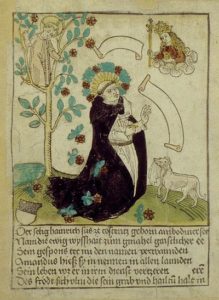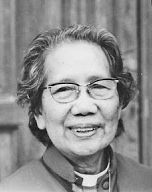1077
In one of the most famous confrontations in medieval history Holy Roman Emperor Henry IV kneels before Pope Gregory VII in the snow at Canossa. A quarrel over whether secular powers could appoint church leaders had resulted in open war between emperor and pope. Gregory excommunicated Henry and Henry nominated a rival pope. The excommunication cut away much of Henry’s support and he was forced at Canossa to beg for forgiveness and reinstatement into the Church. This the pope granted but soon Henry rebelled again. Gregory would eventually be driven from Rome. His last words were “I have loved justice and hated iniquity, therefore I die in exile.”
1366
Death of Henry Suso (b. 1295) was a Dominican monk and mystic. For a period in his life he submitted himself to rigorous mortification of the flesh, wearing underwear studded with brass nails and sleeping on a cross of protruding needles. He later abandoned these as a distraction. Lovers of Christmas carols will know him as the composer of “In Dulci Jubilo“, translated as “Good Christian Men Rejoice”. Suso learned the tune from a dream in which angels visited him and led him in a round dance.
1533
Henry VIII secretly marries Anne Boleyn. Henry had for years sought to rid himself of his barren wife Katherine of Aragon and marry a woman who could provide him with a legitimate male heir. When his mistress Anne Boleyn became pregnant, it forced Henry’s hand. He wed her, though his union with Katherine had not been ended. This was regularized later by his Archbishop of Canterbury, Thomas Cranmer, who ruled that the marriage to Katherine was invalid and the Boleyn marriage lawful. The ensuing legal and religious brouhaha would result in the pulling out of the Church of England from obedience to the pope and the eventual formation of the Anglican Church.
1944
Florence Li Tim-Oi becomes the world’s first female Anglican priest. The Japanese invasion of China had created a crisis for Christians and Christian missionaries in China. Because it was impossible to get a male priest to minister to the Anglicans of Portuguese colony of Macau on the coast of China, Bishop Ronald Hall of Hong Kong ordained Florence Li Tim-Oi. Her ordination was controversial; it would be decades before any church in the Anglican communion would ordain women and her appointment was opposed by the Archbishop of Canterbury when he learned of it. In 1971, however, she was recognized as an Anglican priest. Today The Li Tim-Oi Foundation exists to empower Christian women as agents of change. It provides grants to suitable candidates in the Two-Thirds World to train for Christian mission and ministry. She died in Toronto in 1982.



